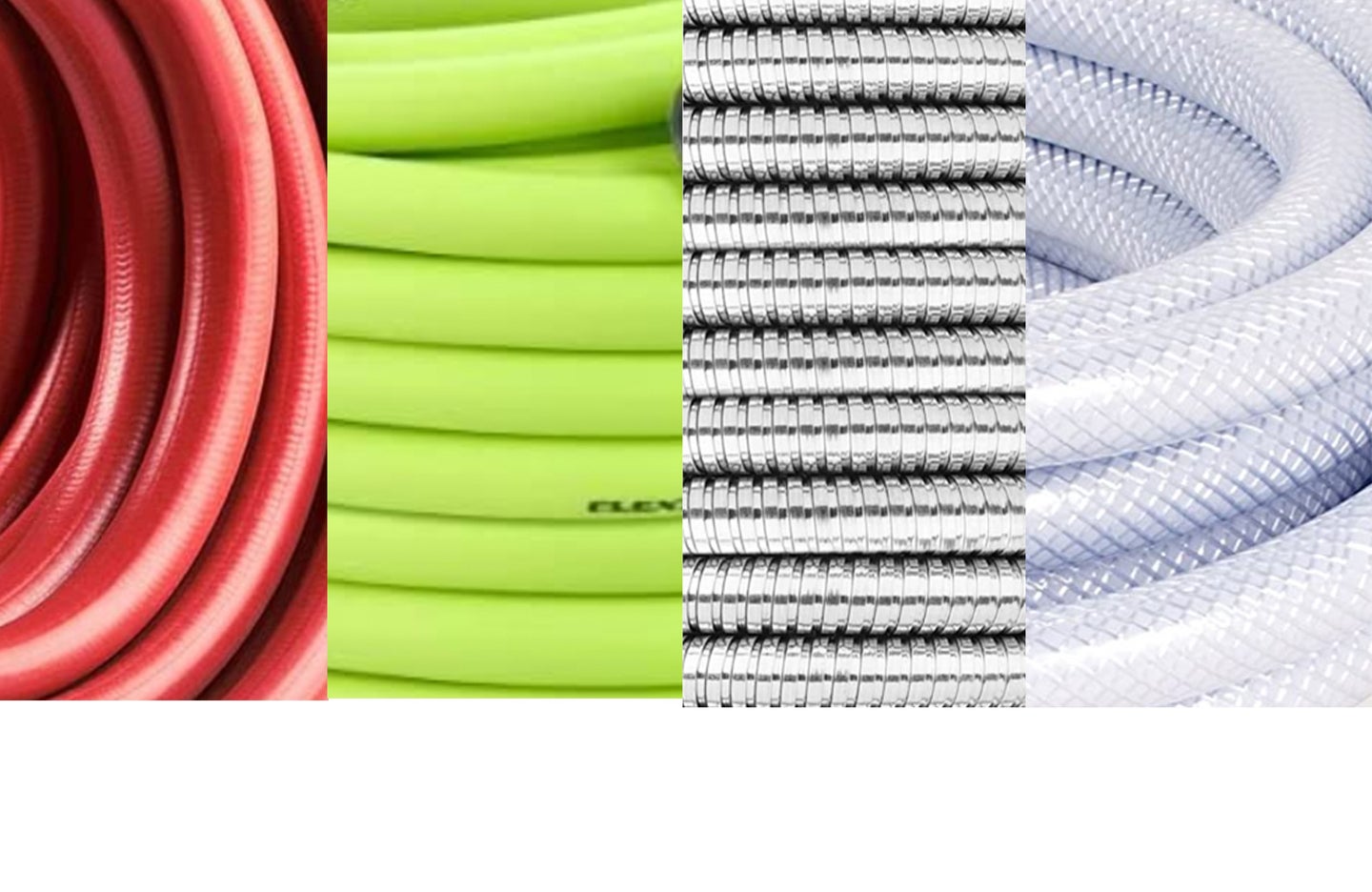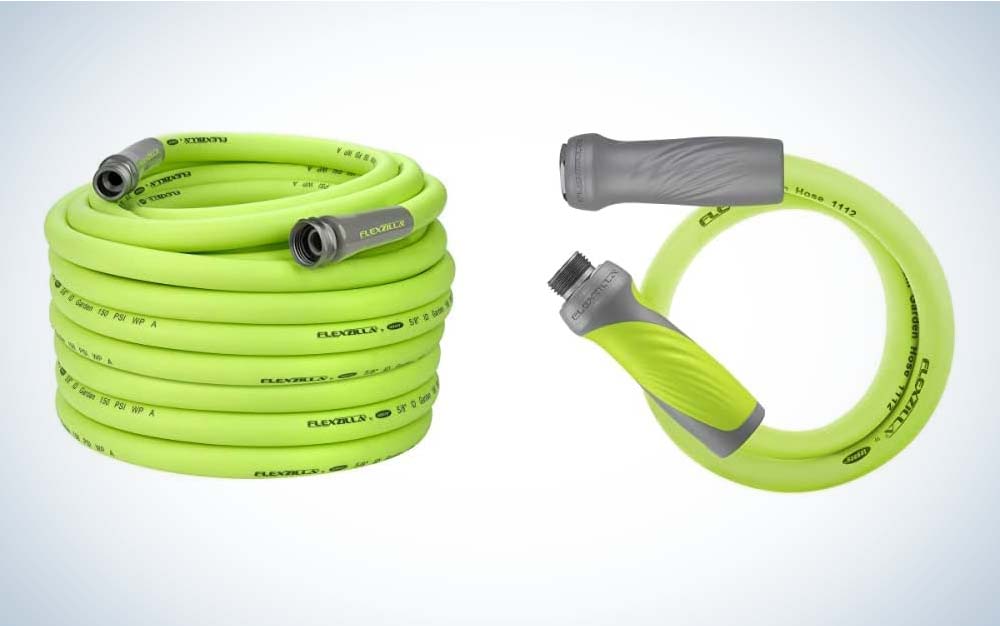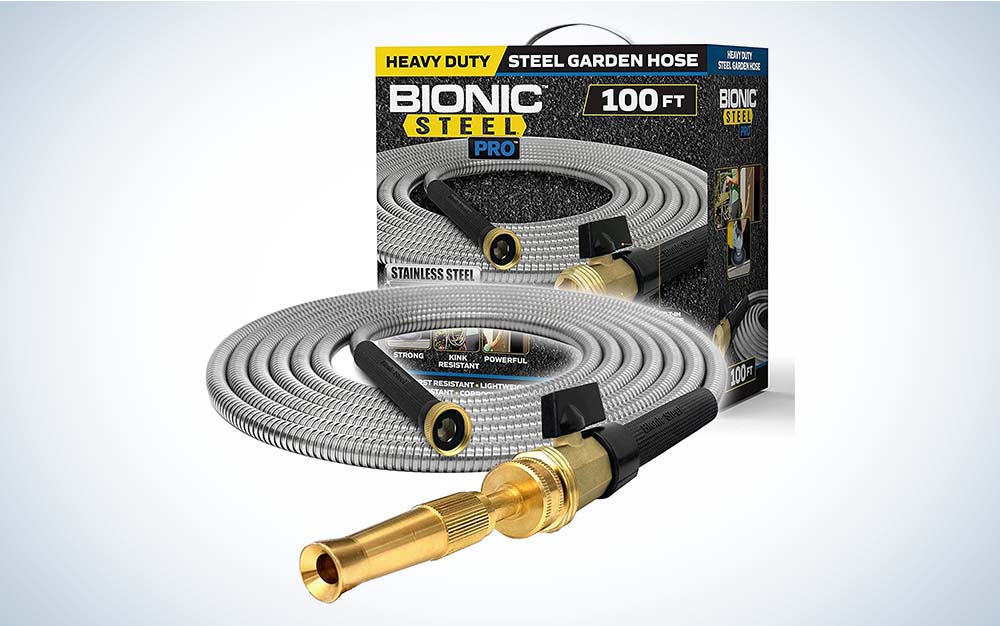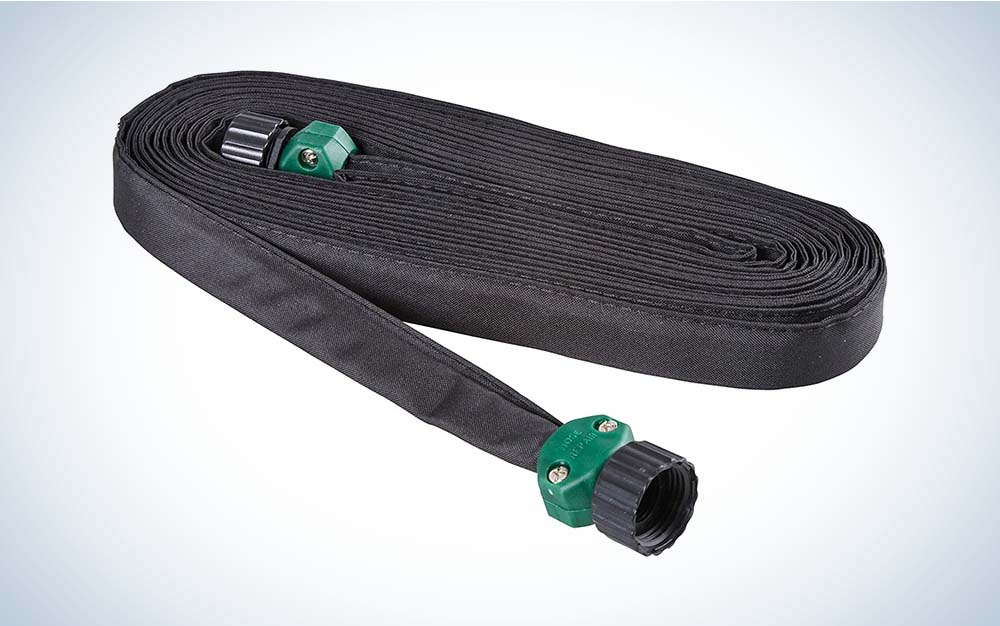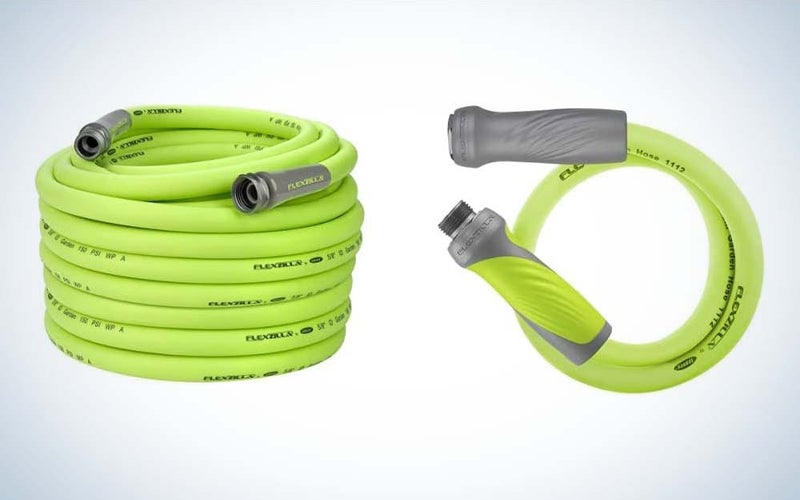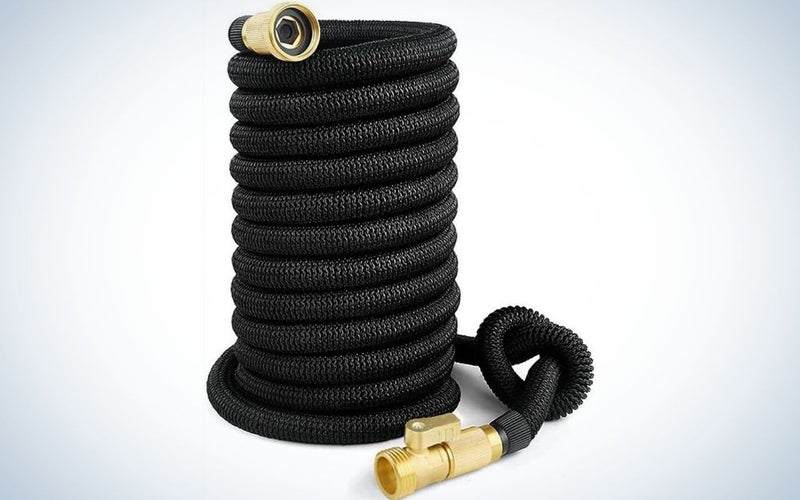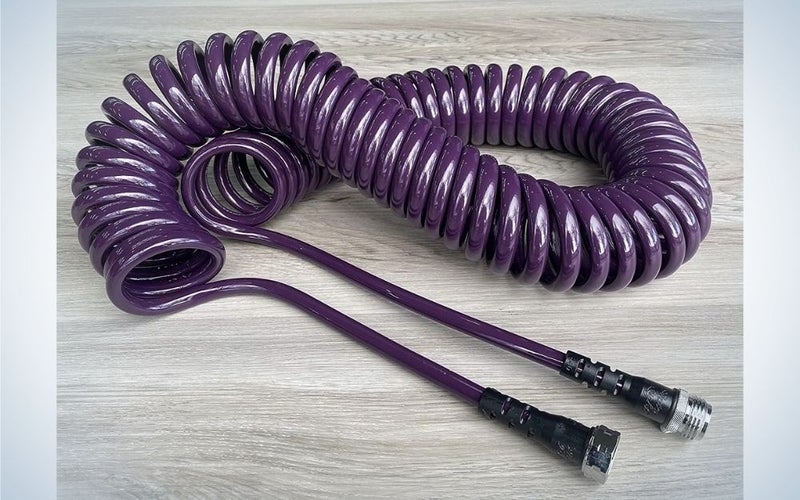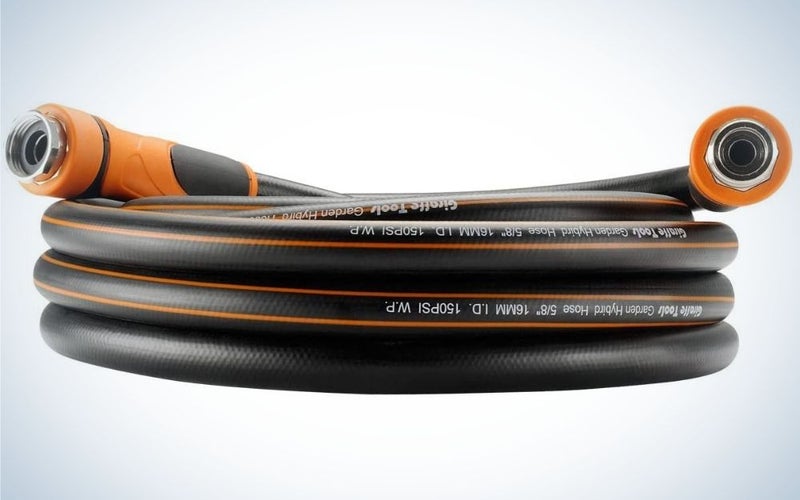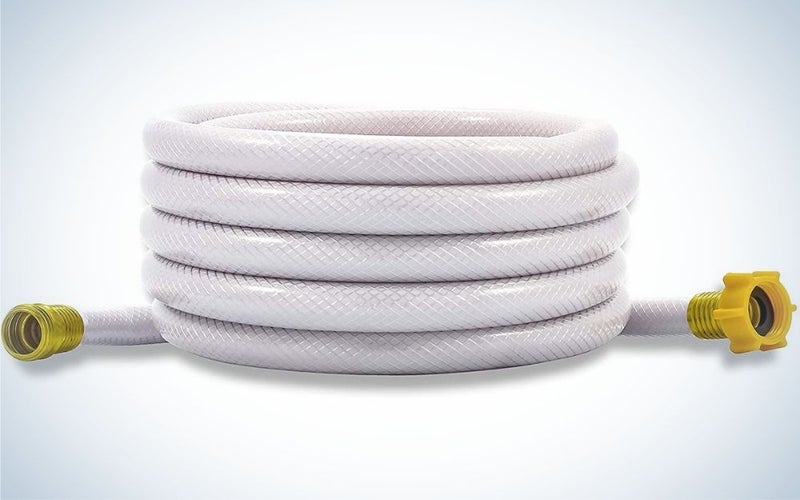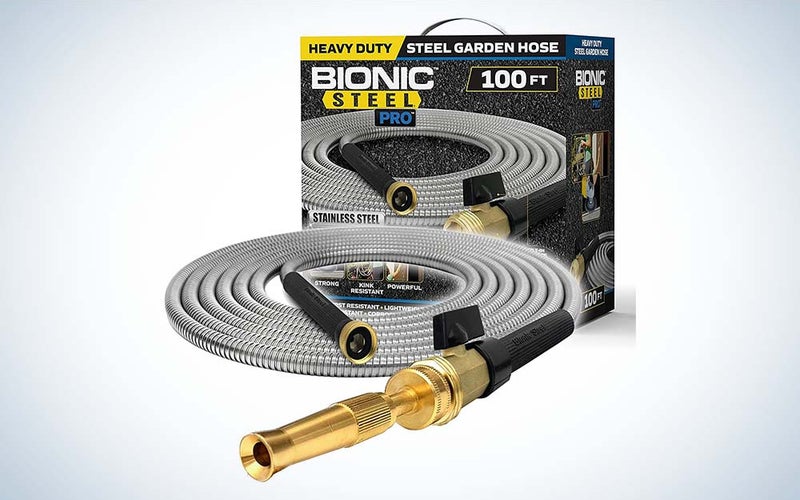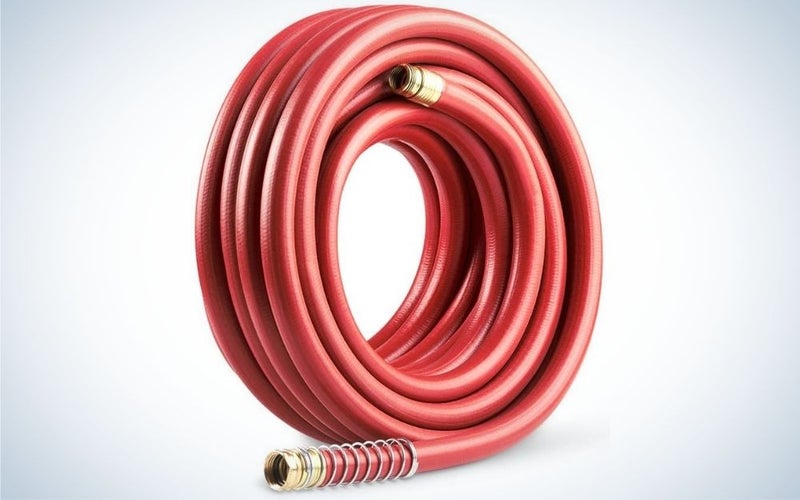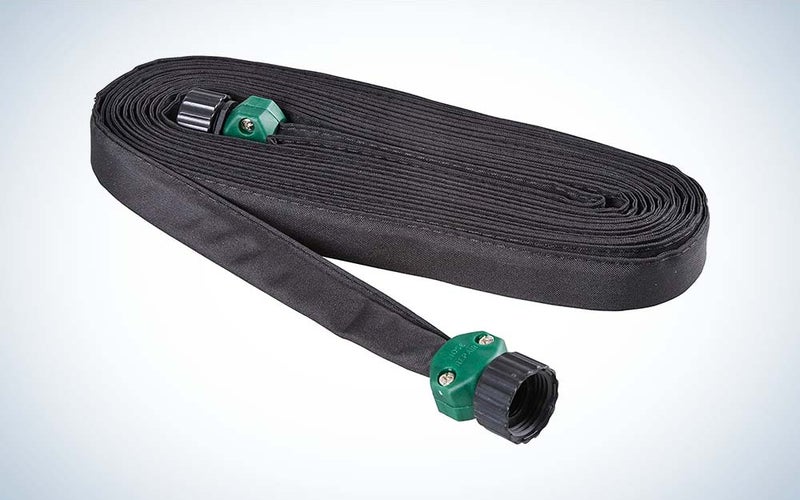We may earn revenue from the products available on this page and participate in affiliate programs. Learn more ›
A garden hose may sound like an afterthought when it comes to caring for outdoor space, but choosing the right model can have a drastic impact on your yard work experience. The options run from lightweight, coiled options designed for smaller yards to heavy-duty models with layers of insulation that are ideal for commercial use. Whether you need something to water window boxes or wash the car, we’ve rounded up the features to look for and our recommendations for the best garden hoses available today.
- Best overall: Flexzilla HFZG5100YW Garden Lead-in Hose
- Best expandable: TheFitLife Flexible and Expandable Garden Hose
- Best permanent coil: Water Right PCH-025-EP-6PKRS 300 Series 25 Foot Coil Hose
- Best hybrid: Giraffe Garden Hose 25 feet Lightweight Hybrid 5/8 inch
- Best for drinking: Camco 25-Ft TastePURE Drinking Water Hose
- Best heavy-duty: Bionic Steel 100 Foot Garden Hose
- Best commercial: Gilmour Pro Commercial Hose 3/4 Inch
- Best budget: Melnor 86050-AMZ Flat Soaker Hose
How we chose the best garden hoses
We conducted extensive product research into more than 40 different garden hoses. We drew on our significant experience from years of yard and garden maintenance when compiling this selection of the best garden hoses. The primary criteria we considered when looking at each type of hose included length, material, and any extra features, like a no-kink design or an included spray nozzle.
Length is a key consideration since a too-short hose might not allow you to water the entire yard; therefore, were prioritized options available in multiple hose lengths over similar ones that come in one size only. We looked for hoses with special features that made watering easier and also factored in the hose’s material and couplings. We then selected products with more durable construction over cheaply made versions. After all, you don’t want your outdoor misting fan’s lifeline to fail you on a sweltering day.
The best garden hoses: Reviews & Recommendations
Shopping for a garden hose isn’t difficult, but buying the wrong length or opting for a heavy-duty model that’s cumbersome to use in a large backyard can easily make you regret a purchase. We’ve rounded up the best options for a variety of situations and price points below so you can make the best decision going in and don’t get soaked.
Best overall: Flexzilla HFZG5100YW Garden Lead-in Hose
Flexzilla
Specs
- Type: Standard garden hose
- Material: Hybrid polymer
- Length: 3-, 5-, 10-, 25-, 50-, 75- and 100-foot lengths available
- Price: $40
Pros
- Lightweight and easy to maneuver
- Kink-free hybrid polymer material
- Drinking-water safe
Cons
- Larger sizes take up a lot of storage space
- Can be heavy
Home gardeners who keep up with watering are likely to appreciate the kink-free design of the Flexzilla Garden Hose. It’s available in convenient sizes for garden use, including 25, 50, 75, and 100 feet. Its flexible hybrid polymer is drinking-water safe, so users can take a refreshing sip while tackling outdoor chores.
This standard garden hose is lightweight and easy to maneuver, with corrosion-resistant aluminum couplings for a secure, leak-free fit. The only shortcoming is that larger sizes take up much space when fully coiled. But as long as one has room to store it, the Flexzilla is a versatile, dependable, and durable choice.
Best expandable: TheFitLife Flexible and Expandable Garden Hose
TheFitLife
Specs
- Type: Expandable hose
- Material: Latex, fabric, brass
- Length: 25, 50, 75, 100 feet
- Price: $62
Pros
- Available in four lengths
- Expands and folds up easily
- Easily transported
Cons
- Fabric exterior can pick up dirt
One of the hottest trends in the past few years has been the invention of the expandable garden hose that doesn’t kink. Patios, driveways, or manicured lawns are all prime locations for this style of hose. These fabric-wrapped, rubberized coils shrink to an easily transported size when the water pressure is turned off and extend to full length when pressure is applied. Some of them come with hangable sacks or can be thrown into an unused pot for easy storage, making for the most convenient option if you don’t enjoy the ritual of a neatly coiled water hose. Because the outer sheathing of an expandable hose is absorbent fabric, these are best used around areas that don’t have a lot of dirt or mulch, as the fabric will pick up pieces of debris when dragged across your yard.
Best permanent coil: Water Right PCH-025-EP-6PKRS 300 Series 25-Foot Coil Hose
Water Right
Specs
- Type: Coiled hose
- Material: Polyurethane
- Length: 25, 50, and 75 feet available
- Price: $42
Pros
- Lightweight
- Fun to use
- Less expensive
Cons
- Can’t handle a large volume of water
- Advertised lengths shorter because of coiling
If your gardening needs are simple and don’t require a large volume of water—and you like the aesthetics of a spring-loaded, lightweight garden hose—the Slinky-type coil hose is right for you. These coils resemble the vintage toy that could magically walk downstairs on its own and, if you stay within the 25-foot length, are a dream to manage. Just getting started? Check out our guide to the best raised beds.
Best hybrid rubber: Giraffe Garden Hose 25 feet Lightweight Hybrid 5/8 inch
Giraffe Tools
Specs
- Type: Hybrid hose
- Material: Polymer
- Length: 2.5, 3, 5, 10, 25, 50, 100 feet
- Price: $29
Pros
- Available in 7 lengths
- Extremely durable
- Designed with inner insulation that keeps it flexible in cold weather
- Strong water pressure of 150 psi
Cons
- More expensive
- Heavy
Made of strong, modern materials that can take temperature swings, sun exposure and rough abuse, these hybrid rubber garden hoses are designed for commercial use and can take a beating. Perfect for connecting to a sprinkler and moving over mulch, dirt, and around trees, the classic hose is the most commonly used for residential applications. For other classic garden hoses, try this 50’ option or this 100’ garden hose.
Best for drinking: Camco 25-Ft TastePURE Drinking Water Hose
Camco
Specs
- Type: Standard hose
- Material: PVC
- Length: 25 feet
- Price: $20
Pros
- Lead-free, BPA-free, and phthalate-free
- Resists kinking
- Comes with UV protection
Cons
- Only available in one size
- Material may degrade over time
If you’ve ever taken a long slurp from the end of a hose, you’ll know that they are not meant to transfer drinking water and commonly leave a plastic, rubbery aftertaste in your mouth. There have been advances in technology in the last few years that eliminate this chemical effect. While the prices are higher and the longevity of the hose can be compromised by the PVC materials that don’t stand up to temperature fluctuations with the strength of traditional rubber, if you’re intent on drinking water from your hose—or need an RV water hose for your camper rig—you’ll want to purchase a BPA-free version like this hose.
Best heavy-duty: Bionic Steel 100 Foot Garden Hose
Bionic Steel
Specs
- Type: Standard garden hose
- Material: Stainless steel
- Length: 25-, 50-, 75- and 100-foot lengths available
- Price: $59
Pros
- Impressive weather resistance
- Crush-resistant aluminum couplings
- Kink-free and rust-proof
Cons
- Reduced flexibility
Durability in all sorts of conditions is the main benefit of the Bionic Steel Garden Hose. It’s made of interwoven stainless steel to resist the effects of such extreme weather as sub-zero temperatures and hot, sunny days. The hose also features rugged, crush-resistant aluminum couplings that can be trampled without damage.
This workhorse of a hose is available in 25-, 50-, 75- and 100-foot lengths, and it’s easy to coil for storage. The stainless steel material is rust-proof and resistant to kinks, though this benefit may reduce flexibility.
Best commercial: Gilmour Pro Commercial Hose 3/4 Inch
Gilmour
Specs
- Type: Commercial garden hose
- Material: Rubber and vinyl
- Length: 25, 50, 100 feet
- Price: $65
Pros
- Incredibly durable
- Double reinforced
- Powerful water pressure of 500 psi
- Available in three lengths
Cons
- Can become stiff
- Must be hand-coiled
You’ll likely use a commercial-style hose for a permanent installation instead of casual daily use, but these hoses are built for toughness instead of flexibility. Often extremely stiff due to their double-walled manufacturing, these are typically not suited for roll-up hose keepers and, instead, must be coiled by hand.
Best budget: Melnor 86050-AMZ Flat Soaker Hose
Melnor
Specs
- Type: Soaker hose
- Material: Vinyl
- Length: 25-, 50- and 75-foot lengths available
- Price: $26
Pros
- Water seeps through the entire length of the hose
- Gentle water release won’t damage plants
- Affordable
Cons
- Plastic coupling is vulnerable to cracking and leaking
Safely hydrate delicate plants with the Melnor Soaker Hose. It’s capped at the end to create the necessary internal pressure for water to seep through its porous vinyl sides. Whereas powerful bursts of water from a standard hose can damage plants, this soaker option gently gives flowerbeds, vegetables, fruits, and other plants the water they need to thrive.
This lightweight garden hose is available in 25-, 50- and 75-foot lengths, and when not in use, it lays completely flat, making it easy to fold and store. The only issue with this Melnor model is that its two couplings are plastic, which may be susceptible to cracking and leaking.
Things to consider when choosing the best garden hose
In addition to length and material, it’s important to understand the various types of garden hoses available. Keep all the following factors and features in mind while shopping for the best garden hose for your needs.
Type
The most common garden hoses include standard, soaker, sprinkler, flat, coiled, and expandable. Different garden hoses may be uniquely suited to specific outdoor duties.
Standard garden hoses run straight, which makes them vulnerable to kinking. They are round in shape and typically use metal or plastic couplings at each end to connect to a faucet or spray nozzle. Soaker garden hoses slowly release water into the garden, thanks to thousands of pinholes along the length of the hose. Sprinkler garden hoses may seem like soakers at first glance, but they have fewer holes, allowing them to function more like a horizontal sprinkler system. Flat garden hoses are intended to reduce kinking. They lay flat when empty but will take on a rounded shape when filled with water. The flat shape also makes them easier to roll and store. Coiled garden hoses have a design that allows them to rapidly return to a more compact, coiled shape after use. This makes it easier to prep the hose for storage. Expandable garden hoses combine the compact storage capabilities of a coiled option with the length and kink-free design of a flat model. It can expand up to three times its length when filled with water and, after use, shrink to its original size for compact storage. The expandable material won’t kink but, over time, may lose flexibility and become unable to expand fully.
Length
While the most common garden hose length is 50 feet, some hoses range from just 10 feet to 150 feet. Take some basic measurements from your outdoor faucet to the perimeter of your yard to determine the best length for the hose.
Keep in mind that the longer the hose, the less water pressure it will have due to friction and drag caused by water flowing through it. So balance the length with optimal water pressure and, if necessary, consider a hose with a larger diameter, which may help you achieve the desired length without losing substantial water pressure.
Material
Garden hoses are made from a range of different materials intended to allow for flexibility while protecting the hose from damage. Common materials include vinyl, latex, rubber, plastic, and various metals.
Vinyl is commonly used for the hose itself. It’s a lightweight, flexible material, though not as durable as other options. These products may also be labeled polyvinyl chloride (PVC). Latex is regularly used to make expandable hoses. It may have a polyester fabric exterior to improve durability and protect the hose from punctures. Rubber is a tough, durable, temperature-resistant material ideal for standard, coiled, and flat garden hoses. However, it is typically more expensive than vinyl. Plastic, commonly used for hose couplings, is more vulnerable to cracking and breaking than metal couplings. Metals like brass, aluminum, and stainless steel, are regularly used to make strong, reliable hose couplings. Stainless steel may also be used to form the exterior of heavy-duty hoses.
FAQs
Q: What is the standard garden hose size?
The standard garden hose sizes are 25, 50 or 100 feet in length—however, longer is not always better. Once you move into the 50-foot or even 100-foot garden hose length, it becomes frighteningly easy to turn the whole thing into a tangled mass of frustration, so keep this in mind if you do decide to purchase a permanent coil hose that’s longer than 25 feet.
Q: How long should a garden hose last?
The best garden hoses should last 10 years or more, but that’s dependent on how well you take care of your garden tools. For example, leaving a hose out in the sun or exposed to other weather elements can cause rapid deterioration and dramatically decrease your hose’s shelf life. If you fully drain your hose after use every time and coil it neatly—kinking can lead to tears and holes—before storing it in a safe place, you’ll get many more years out of it.
Q: What is the best kink-free garden hose?
The best kink-free garden hoses are, hands down, expandable hoses. The design makes it impossible to pinch the flow of water off while you’re using them.
Q: Does garden hose length affect water pressure?
Yes, hose length does affect water pressure. In general, the longer the garden hose, the lower the water pressure, because as water passes through the interior of the hose, the contact causes resistance, reducing water pressure.
Q: What’s the best way to store an expandable hose?
To properly store an expandable hose, turn off the water, disconnect the hose, and allow it to shrink and dry fully. Then simply roll the hose up and place it in a garden box or a shed, to protect it from direct sunlight and, to a degree, extreme temperature changes. Some products come with a storage bag or hook to keep the hose neat when not in use.
Q: Do I need a garden hose nozzle for my hose?
A garden hose nozzle isn’t necessary when it comes to watering the lawn. Users can simply position a thumb partially over the hose opening to direct water over a broad area. However, a nozzle makes watering much easier to control, a benefit when it comes to fragile plants that could be damaged by anything more than a light misting.
Final thoughts on the best garden hoses
- Best overall: Flexzilla HFZG5100YW Garden Lead-in Hose
- Best expandable: TheFitLife Flexible and Expandable Garden Hose
- Best permanent coil: Water Right PCH-025-EP-6PKRS 300 Series 25-Foot Coil Hose
- Best hybrid rubber: Giraffe Garden Hose 25 feet Lightweight Hybrid 5/8 inch
- Best for drinking: Camco 25-Ft TastePURE Drinking Water Hose
- Best heavy-duty: Bionic Steel 100 Foot Garden Hose
- Best commercial: Gilmour Pro Commercial Hose 3/4 Inch
- Best budget: Melnor 86050-AMZ Flat Soaker Hose
A good garden hose is a backyard essential. Even if you’re not much of a gardener, you’ll likely rely on it for a host of tasks, from washing patio furniture to filling the kids’ blow-up Made with drinking water-safe materials, the Flexzilla Garden Hose is lightweight and available in multiple lengths so that you can choose the right size for your yard. If you haven’t the space to store a long hose, TheFitLife Expandable Garden Hose is an excellent and affordable option.
Why trust us
Popular Science started writing about technology more than 150 years ago. There was no such thing as “gadget writing” when we published our first issue in 1872, but if there was, our mission to demystify the world of innovation for everyday readers means we would have been all over it. Here in the present, PopSci is fully committed to helping readers navigate the increasingly intimidating array of devices on the market right now.
Our writers and editors have combined decades of experience covering and reviewing consumer electronics. We each have our own obsessive specialties—from high-end audio to video games to cameras and beyond—but when we’re reviewing devices outside of our immediate wheelhouses, we do our best to seek out trustworthy voices and opinions to help guide people to the very best recommendations. We know we don’t know everything, but we’re excited to live through the analysis paralysis that internet shopping can spur so readers don’t have to.
